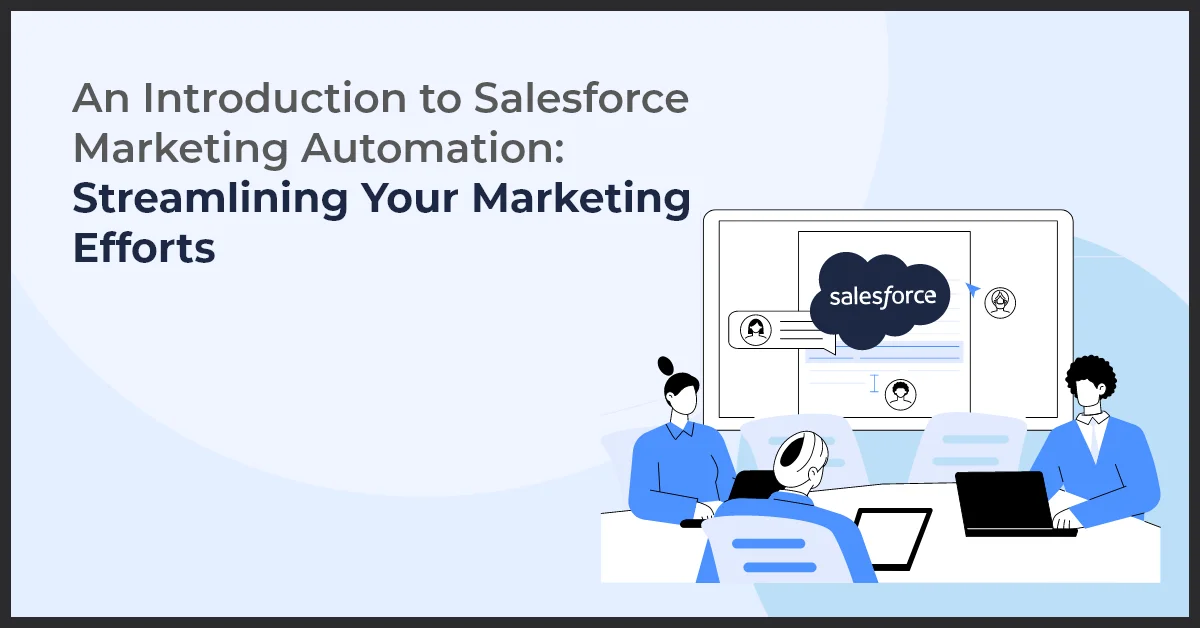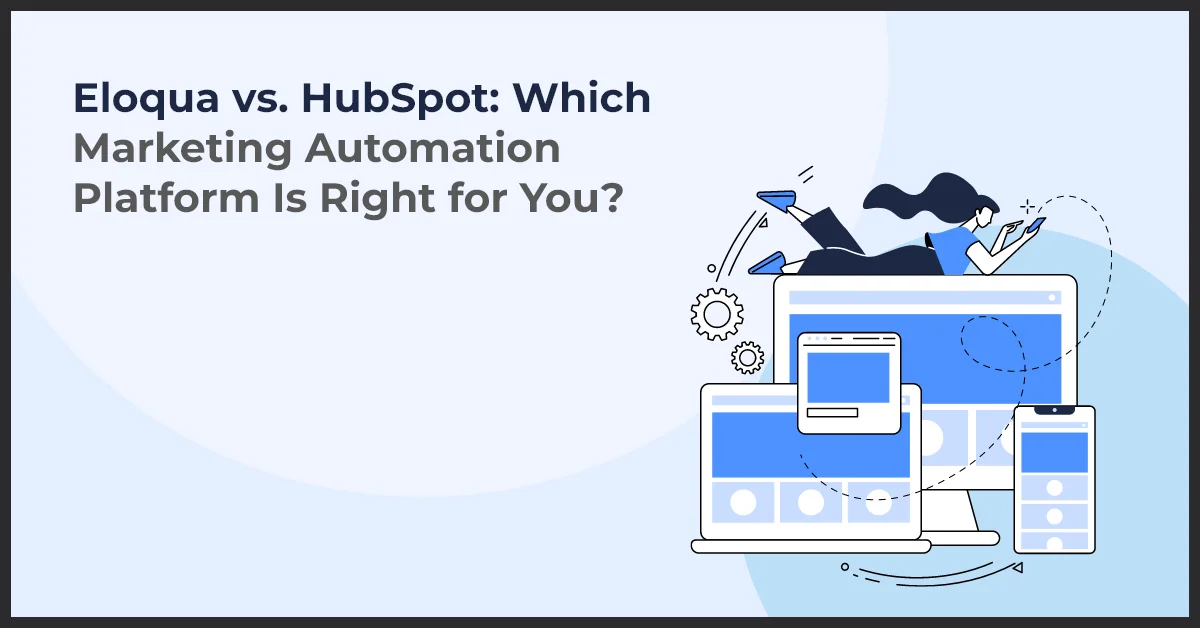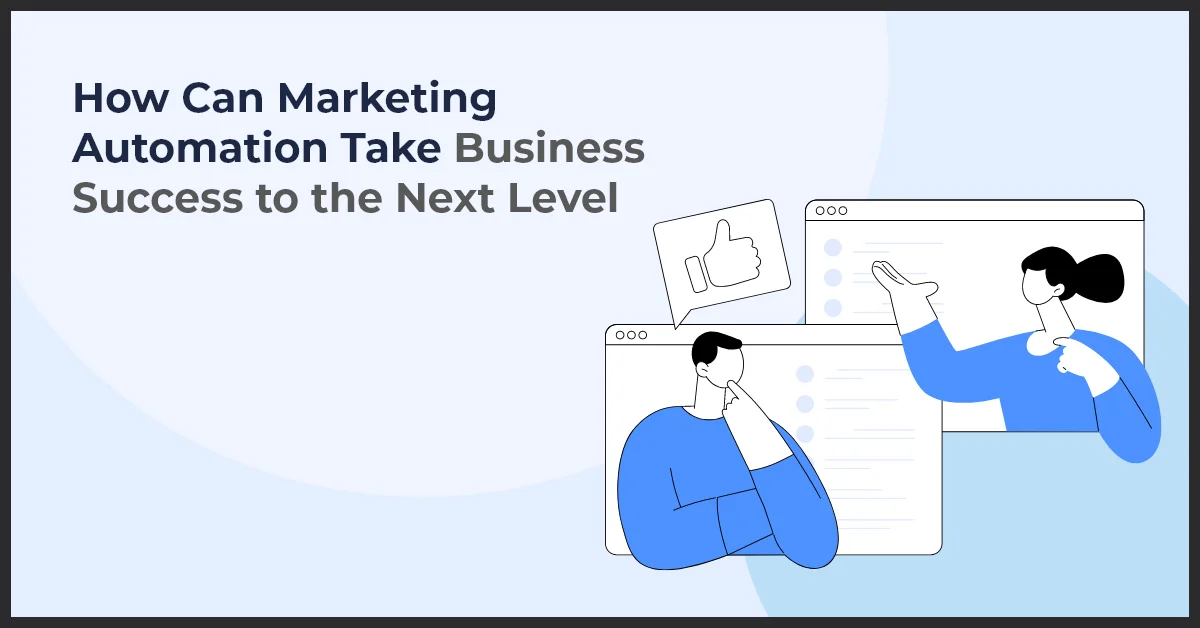Salesforce Marketing Automation: Streamline & Optimize Your Strategy

Published on: October 30, 2023
Updated on: February 28, 2025
2833 Views
- Marketing Automation
14 min read
Salesforce is a versatile and powerful customer relationship management (CRM) platform that has revolutionized the way businesses manage their customer interactions. With its broad range of features and capabilities, Salesforce has consistently proven to be a leader in the CRM market.
As more businesses recognize the crucial role of marketing automation in driving growth and nurturing customer relationships, Salesforce has emerged as a frontrunner in providing cutting-edge solutions. Its robust tools and integrations make Salesforce for marketing automation an essential choice for businesses looking to streamline campaigns, enhance engagement, and maximize ROI.
By integrating marketing automation into the Salesforce CRM, businesses can streamline their marketing efforts, improve productivity, and create personalized customer experiences at scale. In this article, we will delve into the importance of marketing automation within Salesforce and explore how it can empower your organization to achieve marketing success.
How does Salesforce Marketing Automation streamline marketing efforts?
Salesforce Marketing Automation streamlines marketing efforts by integrating key marketing functions into a unified platform. It offers automated campaign management, allowing for the creation and execution of targeted marketing campaigns with minimal manual intervention. The platform also provides advanced segmentation and personalization, ensuring that communications are tailored to specific audience segments based on their behavior and preferences. Real-time analytics and reporting help track campaign performance and make data-driven decisions. Additionally, Salesforce Marketing Automation integrates seamlessly with CRM, enabling synchronized data and enhanced customer insights. These features collectively improve efficiency, drive engagement, and optimize marketing outcomes.
Understanding Marketing Automation
Marketing automation is a powerful tool that can revolutionize your sales and marketing processes. By automating repetitive tasks and leveraging insights from customer data, marketing automation enables businesses to streamline their operations and drive revenue growth.
A. Definition and Benefits of Marketing Automation
Marketing automation refers to the use of software platforms to automate marketing activities such as campaign management, lead nurturing, and customer segmentation.
The benefits of marketing automation are numerous:
- Increased efficiency: Marketing automation eliminates manual tasks, saving time and resources.
- Improved lead management: By nurturing leads with personalized, targeted content, marketing automation helps convert prospects into customers.
- Enhanced customer experience: With marketing automation, businesses can deliver relevant and timely messages to engage customers at every stage of their journey.
- Higher ROI: By automating campaigns, marketing teams can optimize their efforts and achieve better results with less effort.
B. Key Features of Marketing Automation Tools
Marketing automation tools offer a range of features that empower businesses to optimize their marketing strategies.
Some key features include:
- Lead nurturing and scoring: With marketing automation, businesses can automatically nurture leads through personalized content and assign scores based on their engagement level.
- Campaign management and personalization: Marketing automation tools enable the creation, execution, and tracking of multi-channel campaigns while personalizing the content based on customer preferences.
- Behavioral tracking and segmentation: By capturing and analyzing customer behavior data, marketing automation allows businesses to segment their audience and deliver targeted messages.
C. How Marketing Automation Streamlines Sales and Marketing Processes
Marketing automation streamlines sales and marketing processes in several ways:
- Lead Nurturing and Lead Scoring: Marketing automation helps businesses nurture leads by delivering personalized content and scoring their engagement level. This process ensures that sales teams only receive qualified leads.
- Campaign Management and Personalization: By automating campaign management, marketing automation tools allow businesses to execute and track marketing campaigns across multiple channels. Personalized content ensures higher engagement and conversion rates.
- Behavioral Tracking and Segmentation: Marketing automation platforms capture and analyze customer behavior data, enabling businesses to segment their audience based on specific criteria. This segmentation allows for targeted and relevant messaging, leading to improved customer experience and higher conversion rates.
Pro Tip: Use marketing automation to nurture leads with personalized content and scoring, ensuring sales teams focus on qualified leads. Automate campaigns and track customer behavior for targeted messaging that boosts engagement and conversion rates.
Salesforce Marketing Automation Platform
The Salesforce Marketing Automation Platform is a comprehensive solution that enables businesses to automate and streamline their marketing processes, driving greater efficiency and effectiveness in their campaigns. With a wide range of features and capabilities, this platform empowers businesses to deliver personalized and targeted marketing experiences to their customers, resulting in higher engagement and conversion rates.
Overview of Salesforce Marketing Cloud
Salesforce Marketing Cloud is a cloud-based marketing platform that allows businesses to connect with their customers across different channels, such as email, social media, mobile, and the web. It provides a unified view of customer data, allowing businesses to better understand and engage with their target audience.
Integration of Marketing Automation with Salesforce CRM
One of the key advantages of the Salesforce Marketing Automation Platform is its seamless integration with Salesforce CRM. This integration enables businesses to align their sales and marketing efforts, ensuring a more cohesive and coordinated approach. By leveraging the power of both platforms, businesses can optimize their lead generation, nurturing, and conversion processes.
Pro Tip: Leverage the seamless integration of Salesforce Marketing Cloud with Salesforce CRM to align sales and marketing efforts. This unified approach enhances lead generation nurturing and conversion while delivering personalized marketing experiences across multiple channels.
Key Components and Capabilities of Salesforce Marketing Automation
1. Email Marketing Campaigns and Customer Journeys: The platform provides robust tools for creating and executing email marketing campaigns, allowing businesses to send highly targeted and personalized messages to their customers. It also enables businesses to map out customer journeys, ensuring that the right messages are delivered at the right time.
2. Lead Generation and Management: The Salesforce Marketing Automation Platform offers sophisticated lead generation and management capabilities, allowing businesses to capture, track, and nurture leads more effectively. It provides tools for lead scoring, automated follow-ups, and lead nurturing, ensuring that leads are being converted into customers efficiently.
3. Marketing Analytics and Reporting: The platform provides comprehensive analytics and reporting features, allowing businesses to track the performance of their marketing campaigns and derive valuable insights. It offers real-time dashboards, customizable reports, and advanced analytics capabilities, empowering businesses to make data-driven decisions and optimize their marketing strategies.
4. Personalization and Targeting: The Salesforce Marketing Automation Platform enables businesses to deliver highly personalized and targeted marketing experiences to their customers. It offers advanced segmentation and targeting capabilities, allowing businesses to segment their audience based on demographics, behavior, and preferences. This enables businesses to deliver relevant and customized messages, resulting in higher engagement and conversion rates.
Benefits of Salesforce Marketing Automation
Implementing Salesforce Marketing Automation offers several benefits for businesses looking to optimize their sales and marketing efforts.
Let's explore some of the key advantages:
A. Enhanced Sales and Marketing Alignment
By utilizing Salesforce Marketing Automation, organizations can bridge the gap between their sales and marketing departments. The platform allows seamless integration, enabling better collaboration and communication. This alignment ensures a unified approach toward lead nurturing and improves overall efficiency in the sales process.
B. Improved Lead Generation and Conversion Rates
Salesforce Marketing Automation empowers businesses to automate various marketing activities, such as lead scoring, lead nurturing, and personalized email campaigns. These automated processes help in optimizing lead generation efforts, identifying high-quality leads, and nurturing them through the sales funnel. As a result, businesses experience improved lead conversion rates and a shorter sales cycle.
C. Streamlined Sales Funnel Management
With Salesforce Marketing Automation, businesses can streamline their sales funnel management. The platform enables tracking and analyzing customer interactions, providing valuable insights into customer behavior and preferences. This data allows businesses to identify bottlenecks in the sales funnel and implement strategies to overcome them, resulting in a smoother and more efficient sales process from start to finish.
D. Increased Customer Engagement and Retention
Personalized and targeted marketing campaigns are key to engaging customers and building strong relationships. Salesforce Marketing Automation enables businesses to create dynamic and personalized marketing content based on customer preferences, behaviors, and demographics. By delivering relevant content at the right time, businesses can significantly enhance customer engagement and drive customer retention.
E. Scalability and Flexibility of Salesforce Marketing Automation
One of the major advantages of Salesforce Marketing Automation is its scalability and flexibility. The platform can cater to businesses of all sizes, from startups to enterprise-level organizations. As businesses grow and evolve, Salesforce Marketing Automation can adapt and support their changing needs. The platform offers customizable features, allowing businesses to tailor their marketing automation processes to suit their specific requirements.
With these significant benefits, it is no wonder that Salesforce Marketing Automation is a popular choice for businesses aiming to optimize their marketing and sales efforts, drive revenue growth, and achieve long-term success.
Implementing Salesforce Marketing Automation
A. Understanding the Importance of Data Management in Marketing Automation
One of the key aspects of implementing Salesforce marketing automation is understanding the importance of data management in the process. Effective data management ensures that the right information is available to execute targeted marketing campaigns and workflows. By organizing and maintaining accurate data, businesses can enhance their marketing automation efforts and achieve better results.
B. Integrating Salesforce CRM and Marketing Automation Platforms
Integrating Salesforce CRM and marketing automation platforms is crucial to maximize the benefits of Salesforce marketing automation. This integration allows businesses to sync contact and lead data seamlessly between the two platforms, enabling a more holistic view of customer information. This integration offers a variety of advantages in terms of efficiency and personalized marketing.
1. Syncing Contact and Lead Data
The integration of Salesforce CRM and marketing automation platforms enables businesses to sync contact and lead data effortlessly. This synchronization ensures that all customer information is up-to-date and consistent across both platforms. By having a unified view of customer data, businesses can effectively target and engage with their audience.
2. Leveraging Salesforce CRM Data for Personalization and Segmentation
Integrating Salesforce CRM data with marketing automation platforms allows businesses to leverage this data for personalized marketing campaigns and segmentation. With access to customer purchase history, preferences, and demographics, businesses can tailor their marketing efforts to specific customer segments, leading to higher engagement and conversion rates.
Pro Tip: Integrate Salesforce CRM with your marketing automation platform to ensure seamless contact and lead data syncing. This integration enables personalized marketing by leveraging CRM data for targeted segmentation, enhancing engagement and conversion rates.
C. Building Custom-Built Automated Workflows and Campaigns
Implementing Salesforce marketing automation empowers businesses to build custom-built automated workflows and campaigns. With the ability to automate repetitive marketing tasks, businesses can save time and effort while improving efficiency. By setting up workflows that prioritize leads and engage with customers at crucial touchpoints, businesses can nurture relationships and drive conversions.
D. Best Practices for Implementing Salesforce Marketing Automation
When implementing Salesforce marketing automation, it is important to follow best practices to ensure successful implementation. Some key best practices include clearly defining objectives, setting up proper data management protocols, continuously analyzing and optimizing campaign performance, and providing comprehensive training to users. By adhering to these best practices, businesses can maximize the potential of Salesforce marketing automation.
Overcoming Challenges in Salesforce Marketing Automation
Implementing Salesforce Marketing Automation can bring numerous benefits to organizations, but it's not without its challenges. Overcoming these obstacles is crucial to ensure the success of your marketing automation initiatives. Here are some common challenges and how to overcome them:
A. Ensuring Data Accuracy and Integrity
One of the key challenges in Salesforce Marketing Automation is maintaining accurate and clean data. Poor data quality can lead to ineffective marketing campaigns and misalignment between sales and marketing teams.
To address this challenge:
- Regularly clean and update your contact database to remove duplicate or outdated records.
- Implement data validation rules to ensure data integrity during data entry.
- Integrate Salesforce Marketing Automation with other systems to streamline data synchronization and minimize errors.
B. Training and Adoption of Marketing Automation Tools
Introducing new marketing automation tools to your team requires proper training and adoption. Without proper training, you risk underutilizing the platform's capabilities.
To overcome this challenge:
- Provide comprehensive training to your team members on how to effectively use the Salesforce Marketing Automation platform.
- Encourage continuous learning by offering ongoing training sessions and resources.
- Assign a dedicated Salesforce Marketing Automation administrator to provide support and answer questions.
C. Aligning Sales and Marketing Strategies
Sales and marketing teams often have different goals and objectives, which can lead to misalignment when implementing Salesforce Marketing Automation.
To ensure effective coordination:
- Hold regular meetings and discussions between sales and marketing teams to align goals and objectives.
- Define clear communication channels to facilitate collaboration and sharing of information.
- Create shared metrics and KPIs to measure the success of marketing campaigns and track the impact on sales.
D. Continuous Improvement through Testing and Optimization
Optimizing your marketing automation efforts is an ongoing process. It's important to analyze data and test different strategies to improve campaign performance.
Here's how to continuously improve your Salesforce Marketing Automation:
- Regularly analyze campaign performance metrics and identify areas for improvement.
- A/B tests different variations of emails, landing pages, and other marketing assets to optimize conversion rates.
- Leverage the reporting and analytics capabilities of Salesforce Marketing Automation to gain insights into customer behavior and preferences.
By addressing these challenges, you can maximize the benefits of Salesforce Marketing Automation and drive better results for your organization.
Multi-Channel Marketing Integration with Salesforce Marketing Automation
In today's digital age, businesses need to reach their customers through multiple channels to maximize engagement and conversions. With Salesforce Marketing Automation, you can seamlessly integrate various marketing channels to create highly effective and personalized campaigns.
Here's how you can leverage multi-channel marketing integration with Salesforce Marketing Automation:
A. Leveraging Email, Social Media, and SMS for Integrated Campaigns
Salesforce Marketing Automation allows you to connect your email, social media, and SMS marketing efforts to deliver cohesive and targeted campaigns. You can create automated workflows that trigger actions across these channels based on customer behaviors or predefined criteria. For example, when a customer opens an email, you can automatically retarget them with a personalized social media ad or send a follow-up SMS message. By integrating these channels, you can amplify your reach and improve customer engagement.
B. Creating Consistent Messaging and Customer Experience Across Channels
Consistency is key when it comes to building a strong brand and delivering a seamless customer experience. Salesforce Marketing Automation enables you to maintain consistent messaging and branding across all your marketing channels. You can easily customize your email templates, social media posts, and SMS messages with your brand colors, logo, and voice. This ensures that customers receive a consistent experience regardless of the channel they interact with, enhancing brand recognition and building trust.
C. Tracking and Measuring Campaign Performance Across Channels
One of the greatest advantages of Salesforce Marketing Automation is its comprehensive tracking and reporting capabilities. With this platform, you can track and measure the performance of your campaigns across various channels in real time. You can monitor email open rates, click-through rates, social media engagements, and SMS delivery rates all in one place. This holistic view of your multi-channel campaigns enables you to make data-driven decisions and optimize your marketing strategies for better results.
Key Takeaways
- Salesforce Marketing Automation streamlines marketing by integrating key functions like campaign management, segmentation, and personalization into a unified platform.
- Integrating Salesforce Marketing Automation with CRM ensures synchronized data, enhances customer insights, and enables personalized marketing efforts.
- Automation enhances lead management by nurturing prospects through personalized content, improving lead scoring, and increasing conversion rates.
- Salesforce Marketing Cloud supports multi-channel campaigns across email, social media, and SMS, providing businesses with a comprehensive view of customer interactions.
- Salesforce Marketing Automation's scalability and flexibility make it suitable for businesses of all sizes, helping them improve engagement, retention, and marketing efficiency.
Conclusion
It's important to recognize that leveraging data and integration is key to driving marketing success with Salesforce Marketing Automation.
By effectively managing and analyzing data, businesses gain valuable insights that can help optimize their marketing strategies. Integration with other systems and tools allows for a seamless flow of information, enabling a holistic view of customers and creating opportunities for personalized and targeted marketing campaigns.
Throughout this content plan, we have emphasized the role of Salesforce in enabling effective marketing automation. With its robust features and capabilities, Salesforce provides the foundation for businesses to implement and scale their marketing automation efforts.
Remember, successful marketing automation goes beyond just implementing a platform. It requires aligning sales and marketing teams, integrating multiple communication channels, and continuously refining strategies based on data-driven insights.
By embracing Salesforce Marketing Automation and adopting these best practices, businesses can unlock the full potential of their marketing efforts, driving growth and achieving marketing success.
Frequently Asked Questions
Yes, Salesforce can be used for marketing automation. Its Marketing Cloud and Pardot tools help automate campaigns, segment audiences, personalize communications, and track performance, enhancing marketing efficiency and effectiveness.
Marketing automation helps marketers by streamlining repetitive tasks, improving audience targeting, personalizing communications, and providing analytics for campaign optimization. This leads to increased efficiency, better engagement, and improved ROI.
By automating repetitive tasks, targeting the right audience, personalizing communications, and analyzing campaign performance, Salesforce Marketing Automation helps increase efficiency and effectiveness, leading to higher ROI.
Customer journey mapping in Salesforce involves visualizing and automating the entire customer lifecycle, from initial contact to conversion and beyond, to deliver personalized experiences at each stage.
Salesforce Marketing Cloud provides a suite of tools for email marketing, social media marketing, customer journey mapping, and analytics, enabling comprehensive marketing automation.



